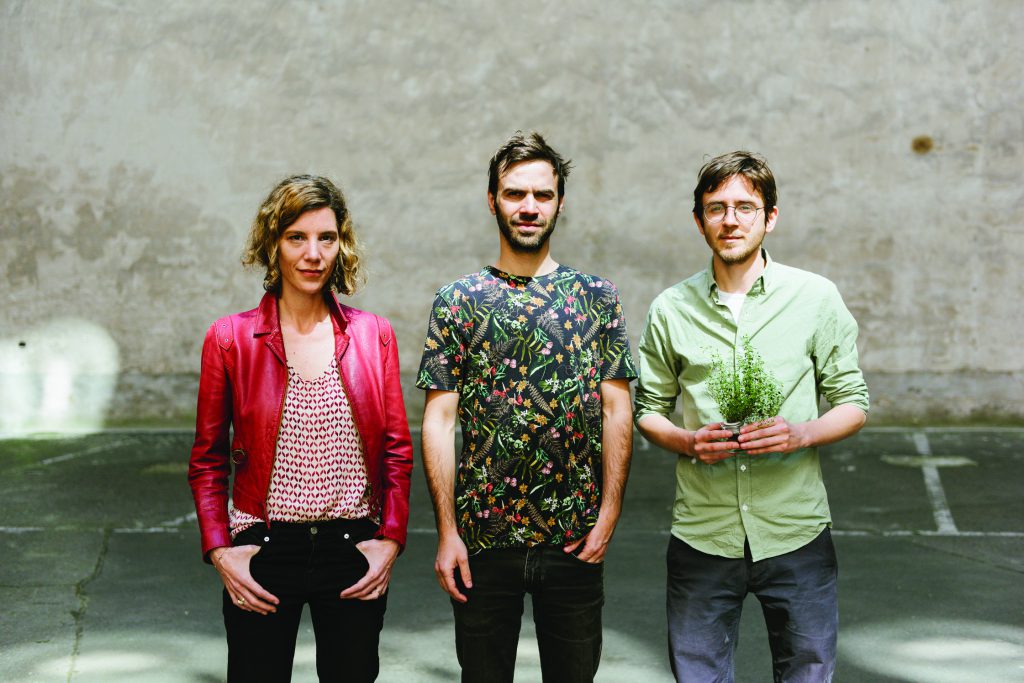Berlin, February 2013. Outside the snow is piling up but in their cosy little apartment in the lively Kreuzberg district, three Israelis sit in front of their laptops watching YouTube. They are learning methods for growing crops at home.
Lettuce after lettuce, spinach after spinach, method after method through trial and error, they grow edible plants and taste them. A month later, with a system of hydroponic irrigation tubes winding through their living room, which has started to feel more like a jungle than an apartment, Infarm, their urban agricultural hydroponic start-up was born. Six years later, with over 150 thousand edible plants growing all over Europe each month, Osnat Michaeli, her partner Erez Galonska and his brother Guy, are setting out to conquer the European vegetable consumer market.
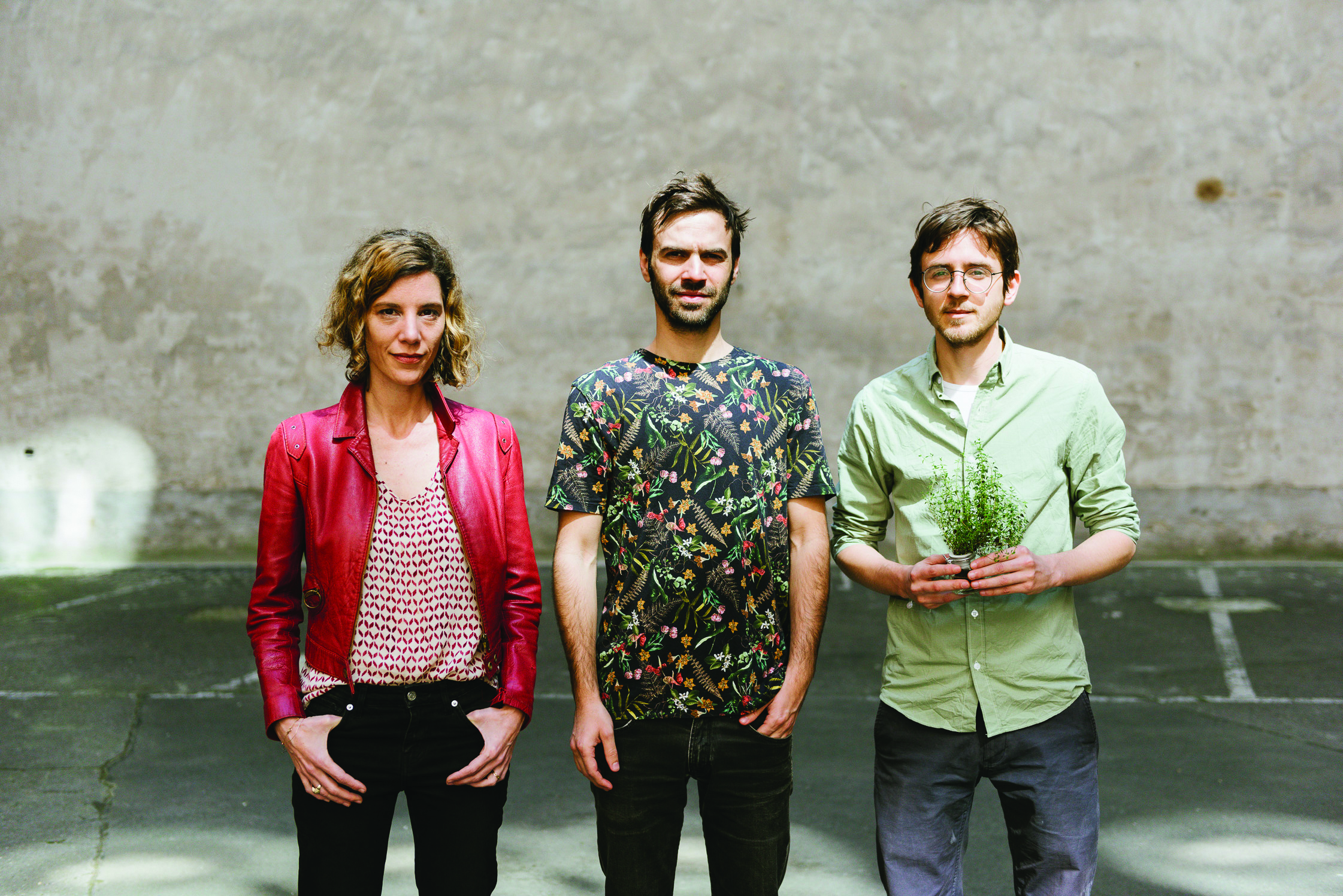
Erez (37) is the company’s CEO, Osnat (42) is responsible for branding and marketing and Guy (30), the technologically-minded brain of the group, is responsible for the product.
The final result is genius in its simplicity. Infarm offers a vertical crop farm on a platform of water. It does not require soil, consisting of modular units, each of which occupies an area of 2 square meters. Units can be connected to one another to create farms of up to thousands of square meters, and all of this in buildings in city centers. The crops themselves are monitored via sensors and enjoy ideal growing conditions.
This system is extremely efficient. The industrial model that they developed, which takes up 25 square meters, can produce 680 thousand plants in a year. According to the founders, this is 420 times more efficient than land-based agriculture.
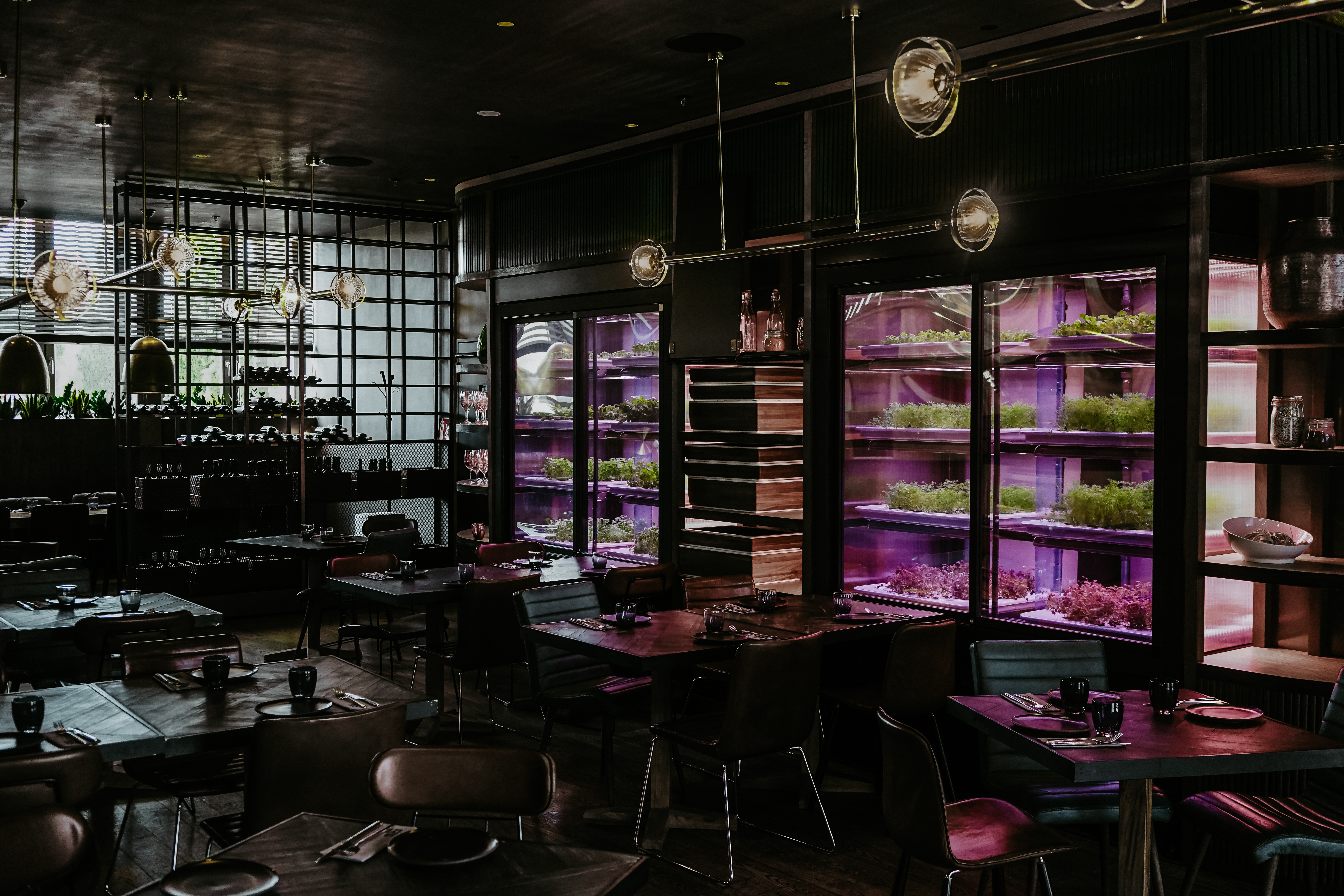
Growing upward
Osnat and Erez met in Tel Aviv. Both of them were working in the film and TV industry, but the encounter between them led them to believe that their future lay elsewhere. They just did not know exactly where yet.
It was a good time to travel around the world. After three years of wandering (in which they managed to skip between Sicily, Lisbon, Vienna, London and the Canary Islands), they found themselves in a little apartment in Berlin playing with the idea that would eventually be their great success. “From the beginning our goal was to start a global company,” says Michaeli. And focusing on agriculture was not incidental; Erez and Guy grew up on Moshav Ganot, so they had some background in the field. Erez, who had had a few adventures in the world himself, had some direct exposure to the world of agriculture. “I did a lot of travel around isolated communities where you grow what you eat,” he says. “So the agricultural life became meaningful to me.”
“What drew me in was the amazing flavor of the things Erez and Guy were growing,” Michaeli adds. “Especially the realization that there are thousands of varieties that I don’t know, that I never tasted in my life and will never have the chance to taste, because they are outside of the global food industry – unless we grow them ourselves.” Infarm’s uniqueness is not actually the growing of plants or bringing it from the country to the city, nor is it the hydroponic system, which is already quite common. It is in the technology that the company developed which enables remarkable control over the growth of all the connected plants (from those growing in France to those in Berlin) via a cloud system that receives data from the sensors in the farms. That is, unlike in classic or even innovative agriculture, Infarm has no one crop center – they actually grow everywhere, in hundreds of sites, and still maintain the benefits of crop uniformity through the cloud system that ensures plant quality.
“We developed the most advanced modular farms in the world,” says Erez. “They can be set up quickly and we can easily adapt them to each retail customer, according to what they need.”
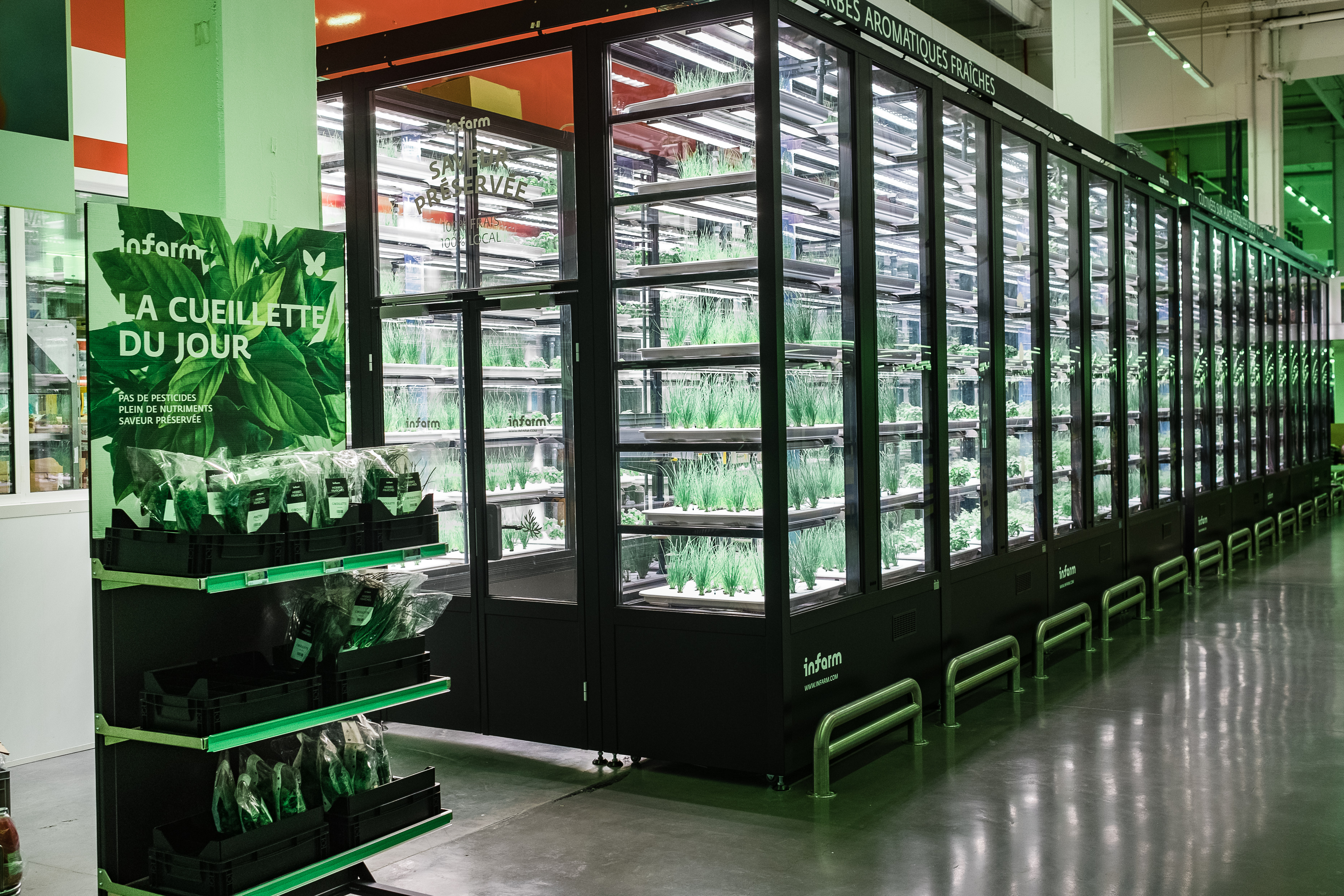
“The platform that we created addresses all of the parameters of plant growth,” adds Michaeli. “We receive about 50 thousand data throughout the course of the life of each plant in the farm. Actually you could say that the plants communicate with the system and ask for what they need.”
“Plants are influenced by an extraordinary number of parameters,” Guy explains. “Water, temperature, the strength of light, the light spectrum, fertilizer levels, CO2 levels, the concentration of dissolved oxygen in water, which plants are growing next to which and so on. When these change over time, the plant responds accordingly and this results in a change in its taste, shape and concentration of nutrients. And if that’s not enough to take into account, some of these variables also affect one another, which makes the work of plant research and optimization a very slow process.
“At Infarm, each crop unit has a double purpose. On the one hand, it’s a farm that produces hundreds of plants a month, but at the same time, it is a research platform which allows us to examine what is happening with our plants at every minute throughout the day. It is an excellent basis for machine learning, which is able to manage the complexity of agriculture and of hundreds of experiments happening simultaneously.
“At the end of every growth cycle (twice a week), the results are entered into the cloud to optimize for the next round. This process enables a significant increase in quality and output over a relatively short period of time,” says Guy.
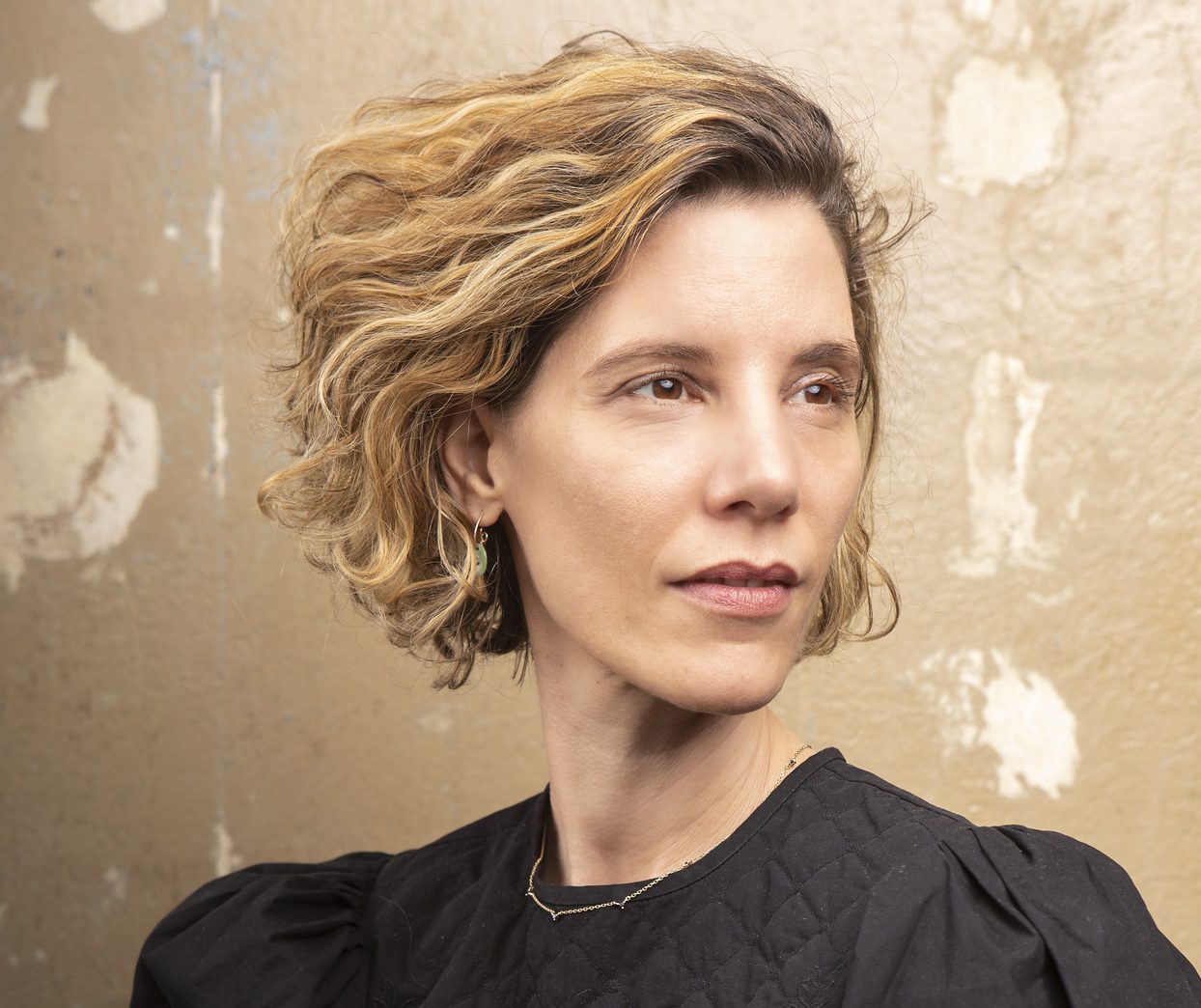
“This system receives data all the time (every 10 seconds) and improves itself – so that each and every plant grows better than the one before it,” Michaeli sums it up.
With the help of the monitoring and the network which is connected to the cloud, the system controls farms remotely and operates mostly automatically. “In agriculture, there are constant issues to be attended to; with our system everything is done in real time through the cloud. As soon as any need arises it is immediately located and dealt with,” Michaeli explains.
By the way, this does not mean that there is no need for human hands – Infarm employs a team that builds the farms and “plants” the sprouted seeds, but the growing process itself is automatic. “In fact, two or three weeks after the installation, clients can already gather fresh, pesticide-free crops that contain more nutrients than the vegetables in the stores, since they are offered for sale while they are still alive,” notes Erez.
From the garden to the supermarket
Since the dawn of time, humans have been in close communion with nature. For all of us, but particularly those of us who have always lived in cities, there is a certain magic to harvesting fresh food, to make a salad from leaves that were growing just moments ago. It is this feeling that Infarm wants to stretch to its limit.
The first step was close to home, in a community garden in Kreuzberg. The three founders started a farm and invited passersby to taste the plants, learn about the growing process and discuss contemporary agriculture. That was when they began to sense Berliners’ excitement at the concept.
The next stage was the development of the “farm restaurant” in an industrial space in the heart of the district. The restaurant operated for a few months and was later converted into an exhibition space for the company.
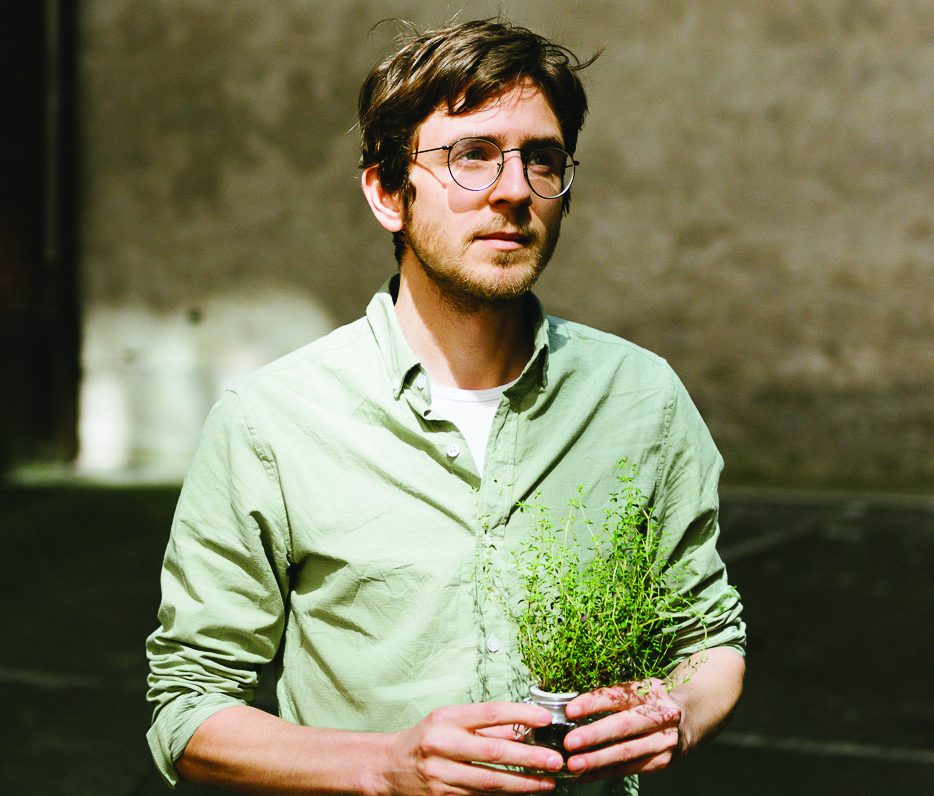
But their big break came in 2016, when the three partners began collaborating with the German supermarket chain Metro. Together they created a pilot that included bringing a farm prototype into the supermarket. Osnat, Erez and Guy filmed and distributed a promotional video which got 7 million views in two weeks. “The image of the vegetables growing right where they’re being sold was very powerful. Thanks to that project, lots of supermarkets began coming to us – and that was when we realized that we were really onto something big in this market,” says Michaeli. A year after the pilot, Infarm signed a huge agreement with Edeka, the largest chain of supermarkets in Germany.
Today the company already has more than 25 clients and its farms are installed in 230 supermarkets in Germany, France, Luxembourg and Switzerland. Another 150 Infarm systems are installed in logistics centers. These farms are growing over 150 thousand plants a month and by the end of the summer the company will have arrived in both England and Holland with plans to be in the USA by the start of 2020 and Japan not long afterwards. “We are in negotiations with many of the biggest chains in the world. We are talking with one of the largest chains in the US,” says Michaeli, refusing to name the chain.
Today Infarm’s farms grow over 65 kinds of herbs and vegetables, mainly leafy ones – from lettuce and spinach, herbs like dill, basil and thyme to other, more “exotic” plants like bok choy, Peruvian mint, wasabi arugula, spring greens and even wild za’atar from the Middle East. But they are already busily working on the next stage in their laboratory – mushrooms as well as fruits and vegetables such as strawberries, cucumbers and tomatoes. These should reach the shelves by next year.
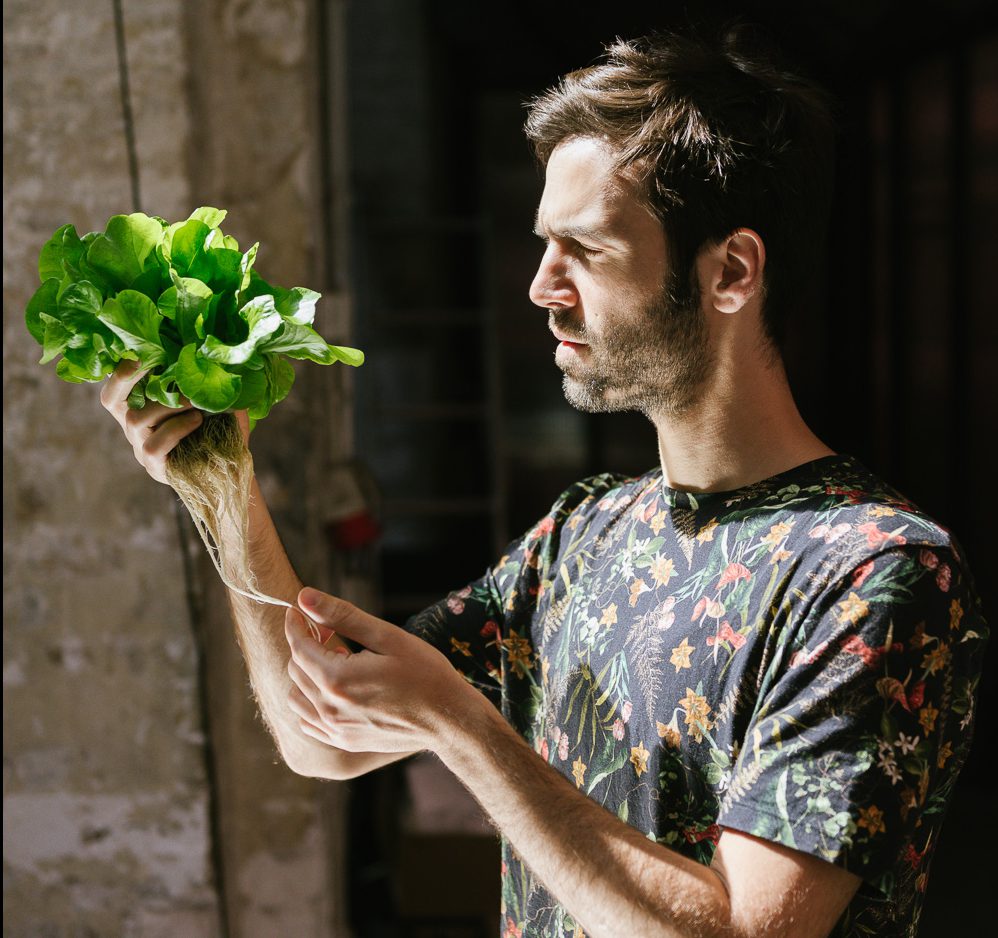
Investors are swarming
This dizzying growth was largely possible on account of great sums of money that flowed into the company. Infarm managed to capture the hearts, not only of the consumers, but also of their investors; the enterprise makes a lot of business sense and has a strong sustainability agenda which is well-suited to the business arena, and particularly the European market.
But their success did not happen overnight. For the first three years, Infarm had virtually no funding from large bodies and operated almost exclusively on money from crowdfunding and loans that the three founders took from family members. The first significant sums of money came when the three entrepreneurs received two grants from the European Union and smaller investments from a few angel investors.
After that, there were three rounds of fundraising. In the last one, which finished last month, they raised $100 million, led by the London-based Atomico fund, a representative of which now sits on the company’s board of directors. This was added to the $35 million that they raised in the previous rounds from a number of venture capital funds, some of which specialize in impact investing, such as Astanor Ventures. Infarm declined to provide data on the company’s valuations and revenues.
Service included
Infarm’s business model also evolved as the company developed. When they got started, Infarm focused on simply selling its product – that is, they sold the farms and guaranteed their operation and the provision of required materials for cultivation. “One of the most challenging things in this business is to understand what our commercial model is – that was definitely something that evolved,” says Michaeli. “We sold the first farm we installed to a supermarket – but then we realized that the model must be adapted to the customer.”
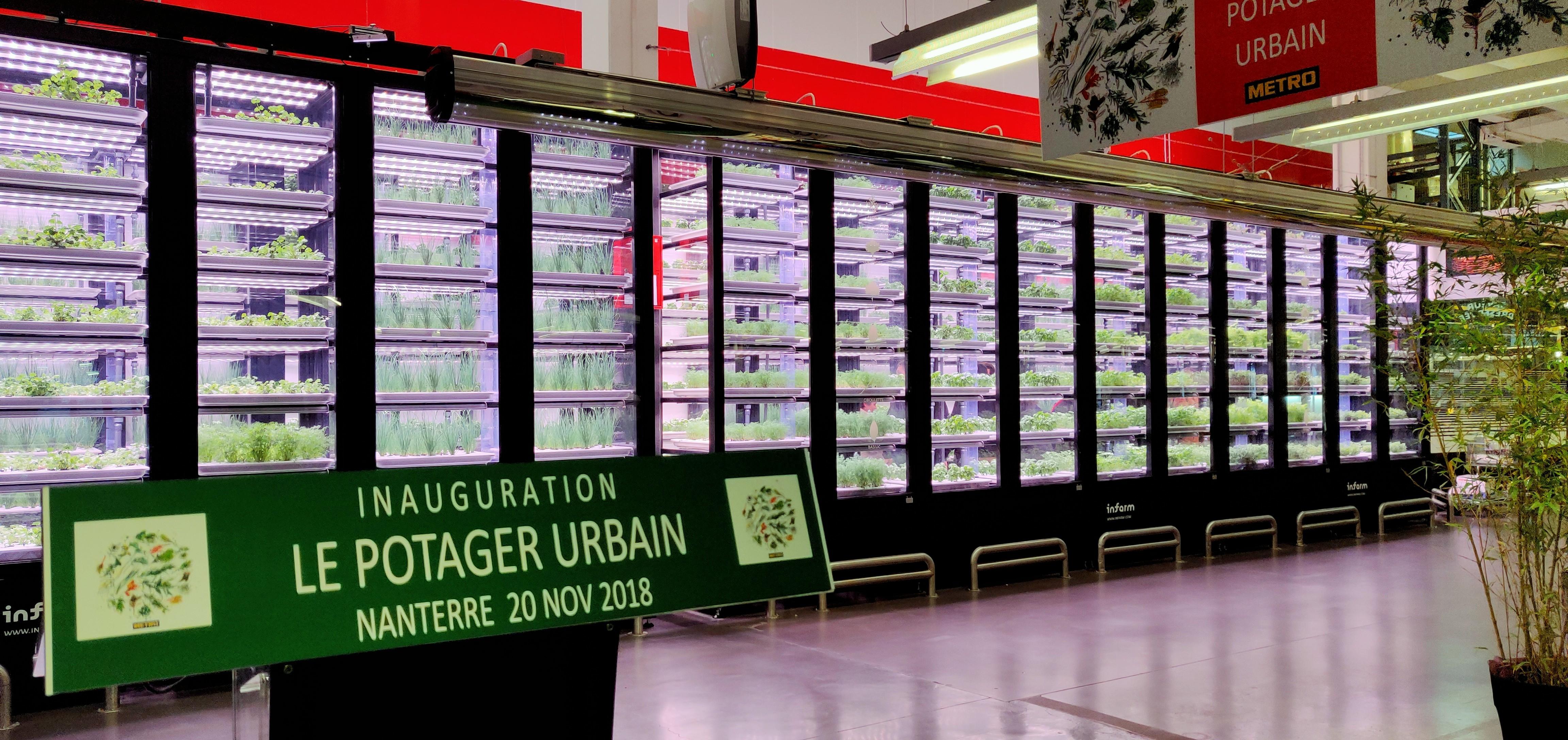
The notion of “adapting the model to the customer” means that Infarm began to sell not just a product, but its service too. “Today we give supermarkets a different service. We come to them and plan the farm with them to adapt it to their needs. We install the farms and look after everything they require. The supermarket doesn’t buy the farm, rather they buy everything that the farm grows in exchange for a fixed price, and then they sell that to their consumers as usual. The store actually receives product that is packaged, branded and ready for sale,” Michaeli explains. “The retail price is an average price for the vegetables, not the cheapest nor the most expensive. The consumers are getting premium quality at a very competitive price.”
The model also functions beyond supermarkets. The next stage for Infarm was to connect with the distributors. Though they don’t have direct contact between the consumer and the plant while it’s growing, there is still certainly a significant reduction in the transport chain. “Instead of the products traveling an average 2,500 km from the field in a faraway country to the shelf in the local supermarket, and passing through an average of 28 pairs of hands on the way, they take a short, direct trip from the distributor’s logistical center to the point of sale,” says Michaeli.
“The supermarkets are our biggest clients and the ones that enable us to reach so many people,” she explains. “But apart from them we also work with restaurants, this year we will install the first farm in a school cafeteria, and now we also have distributors. The supermarkets themselves are also distributers, and we also grow crops in their distribution centers, but then there are distributors that are not supermarkets, like those that typically import products from Africa, Spain or Israel and now they are selling directly from their farm. Now, for example, we are building a farm for Germany’s biggest distributor of herbs – they’ll grow them in their warehouses and then sell all of their produce.”
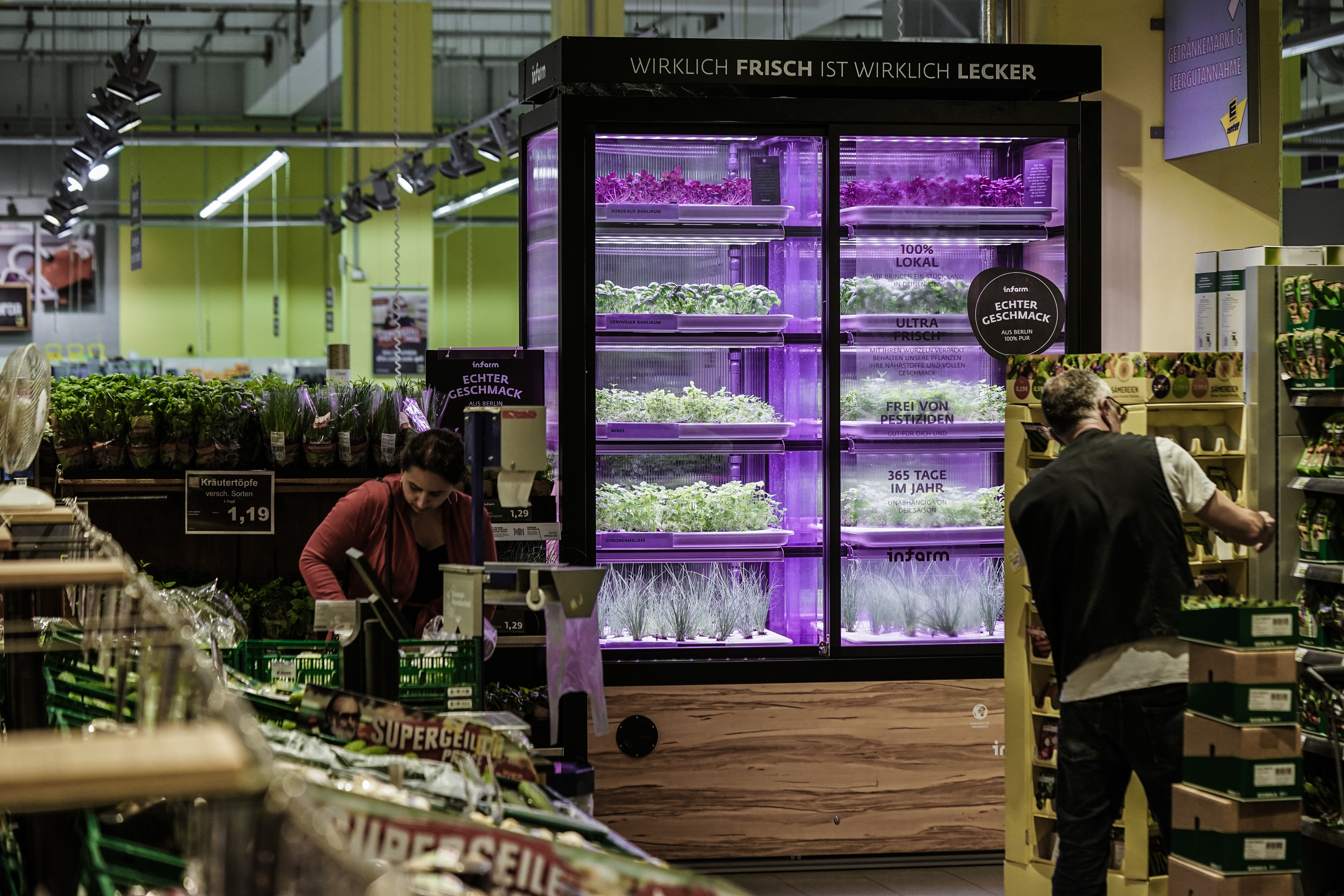
Utopia
It’s no coincidence that Osnat, Erez and Guy found themselves in Berlin. According to them, the city was the perfect location to launch the business, since most of the food in Germany is imported, and constitutes an enormous market in this part of Europe. But the character of the city and its diverse population also played a role. “Berlin is like an innovation incubator and home to an expanding start-up scene,” says Erez. “The city attracts amazing talent and a variety of skills from all over the world. In terms of ‘team building’ this was an amazing place to get started.”
The company, which began with its three Israeli entrepreneurs, employs around 250 people now, from 40 different countries – Australia, Korea, Spain, as well as Iran and Syria and others.
“The interaction is amazing,” says Osnat. “It’s utopia. We are building a better future for humanity together and everyone is invited. There are programmers, engineers, designers and biologists alongside farmers, marketing and business people – it’s a once-in-a-lifetime team.
“Food, innovation and technology are all international languages – and the flavors actually often connect the Israelis who work in the company with other people from the Middle East,” Michaeli explains. “We have a lot of plants in our catalogue that are very common in the Middle East and flavors always evoke stories and recipes that all of us can enjoy and identify with.”
Today Infarm is located in its new headquarters in the Tempelhof neighborhood in Berlin. This is also where their central farm and laboratory live. The project which began in a small apartment is slowly turning into an empire that is taking over the European consumer vegetable market.
But in spite of their success, Osnat, Erez and Guy don’t forget where they come from. “We bring a lot of our Israeli-ness into our work: the creativity, the innovation and the energy,” says Michaeli. The Israeli market is not currently in the cards but the team does not rule out coming here in the future.
“Our motto is to supply the best, healthiest and tastiest products and a good price to everyone, while significantly improving the impact on our planet,” says Michaeli.
“The goal that we set for ourselves is to be in 10,000 supermarkets all over the world by 2020, and to grow over 100 million plants in a year,” concludes Erez. “And our vision? By 2050 we will feed the 7 billion people who live in the world’s urban centers.”
Translated by Zoe Jordan

